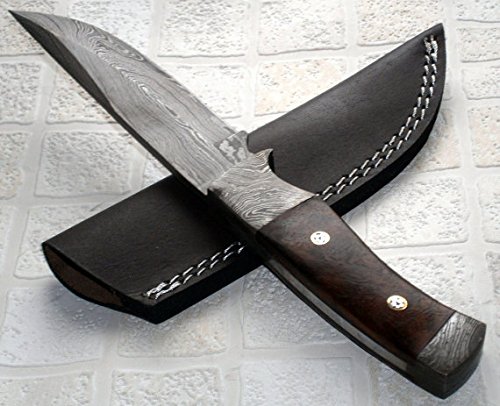(This site is reader-supported. When you buy something using retail links on our articles, we may earn a small commission. As an Amazon Associate I earn from qualifying purchases.)
Do you love to have a beautiful-looking knife blade? If yes, you must have surely looked for Damascus knives. 15N20 steel is one of the widely used steels for making Damascus steel blades. Most of the time it is used in combination with other steels such as 1095 carbon steel for making knives. Let’s explore the steel’s chemical composition, properties, and performance compared to other knives.
What is 15N20 Steel?
15N20 is a kind of steel alloy that comes from the German brand, Bohler. It is a carbon steel having high nickel, hence is admired for its versatility as well as great toughness. Many times, it is used along with 01, 1075, 1084, and 1095 steels to form pattern welded Damascus steel. So, it is common to spot a knife made using 1080/15N20 or 1095/15N20 steel alloy. All these three steels are carbon steels, as they contain a high amount of carbon.
Particularly, 15N20 steel is what you obtain as the output when you add more nickel to the chemical composition of 1075 steel. Apart from Damascus blades and swords, 15N20 is mainly used for designing knives of all sizes, including swords. You can easily find it in kitchen knives, wood carving knives and woodworking tools such as band saw blades. You may also find this steel in a few cheaper knives available in the market.
A few naïve knifemakers prefer using this steel for practice, as it is not that difficult to work with it or process it. Due to a relatively low difficulty level to work with, this steel is ideal for even professional knife makers.
Chemical Composition
The structural mix of 15N20 is unique, as it has no chromium. Stainless steels are in demand due to their resistance to corrosion as well as oxidation. However, to be a part of these steels, there should be at least 13% chromium content. Following are the components that make up this alloy steel:
- 0.75% Carbon: For improved hardness, wear resistance, abrasion resistance, as well as corrosion resistance
- 2% Nickel: For improved toughness and corrosion resistance (too much of it can reduce hardenability.)
- 0.4% Manganese: For improved tensile strength, hardenability, as well as wear resistance
- 0.03% Silicon: For improved resistance to corrosion and strength
- 0.02% Phosphorus: For improved strength, machinability, as well as the hardness
- 0.01% Sulfur: For improved machinability
In terms of chemical composition, 15N20 is considered equivalent to AISI L6. Both also belong to the same price range and showcase good edge retention, high hardness, good wear resistance, and low corrosion resistance.
Steel Hardness
On the Rockwell scale, the hardness rating of 15N20 ranges from 61 to 65 HRC. The exact rating depends on the kind of heat treatment implemented by the manufacturer. The specified range makes 15N20 one of the hardest steel grades available in the market.
This is attributed to the carbon and high nickel content. The amount of nickel is more than many other nickel steels. The high hardness level makes this steel capable of resisting abrasion and wear effectively. Its blades will also not scratch or deform easily.
Steel Properties
- Great Toughness: Considering the high hardness range, a knowledgeable reader would deduce that 15N20 is less tough. However, this steel is tough enough and is less likely to chip or break. The credit for this toughness goes to the high nickel volume in its alloying mix. The improved toughness justifies why this steel is used for making woodworking tools, fishing knives, and kitchen knives, which need to be truly tough. It is also the reason why this steel is preferable for pattern welding and brighter steel parts.
- Good Wear Resistance: This is expected due to the high level of hardness. You can expect this steel to keep wear and tear at bay for a long time. The credit for this goes to the inclusion of manganese and silicon.
- Good Edge Retention: Indeed, 15N20 is not the best steel when it comes to retaining a sharp edge. Yes, it lacks in this area when compared to steels such as 1084. However, it has a keener edge retention ability than high-carbon steels available in the market. Again here, the credit goes to the high nickel volume (2%). While nickel does not form nickel carbides, it is known to contribute to good edge retention, although not for very long.
- Low Corrosion Resistance: This is obvious because of 0% chromium in the chemical mix. So, will this steel rust? Yes, it will but at a slower pace than straight carbon steel!. It can resist corrosion and rust to some extent due to the presence of nickel. However, it is essential to clean and lubricate its knife blade after using it every time so that corrosion can stay away.
- Ease of Sharpening: Although 15N20 is quite hard, it is not that tough to sharpen its edge. Due to the nickel content, this steel will allow you to get a sharper edge quicker than many other high-carbon steels.
Comparison With Other Knife Steel Options
15n20 vs 1095
15N20 wins over 1095 in terms of toughness, ease of sharpening, and edge retention due to the inclusion of nickel. It is also easier to work with 15N20 than with 1095. As both the steels do not contain chromium, they have poor corrosion resistance ability.
15N20 vs 1080
1080 is somewhat harder than 15N20 because of higher carbon as well as manganese contents. However, this makes 15N20 tougher.
Top 15N20 Knives on Amazon
Most 15N20 knives are usually Damascus steel knives in which it is forge-welded together and acid-etched with 1095 or other carbon steels.
| Image | Title | Price | Buy |
|---|---|---|---|
 | Super Knife Damascus Steel Ulu Knife | Check Price on Amazon | |
 | ShowJade Damascus Steel Wood Carving Knife | Check Price on Amazon | |
 | BC- T- 019 Custom Handmade Damascus Steel Knife | Check Price on Amazon | |
 | WolfKlinge Handmade Damascus Steel Folding Pocket Knife | Check Price on Amazon |
So, is 15N20 a Good Knife Steel?
Yes, the 15N20 steel is a great option for both knife makers as well as users. Users revere the toughness and edge retention abilities of this steel. This steel is a popular choice when it comes to making chef knives despite having a low resistance level to corrosion. However, with proper care, corrosion and rust are less likely to surface.

Hi, I am Jay. I am the creator of Knife Guides, your one-stop site for everything related to knives. I am a computer engineer by profession, knife aficionado by passion. Here I work with a group of people who’ve always had a passion for knives and blades. Over the years we’ve kind of become experts and decided to share our knowledge and ideas. I am also an avid hiker and enjoy offshore gamefishing.


